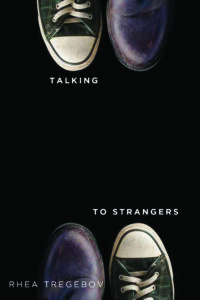The rhythms of mourning
Talking to Strangers
by Rhea Tregebov
Montreal: Signal Editions, 2024
$13.99 / 9781550656602
Reviewed by Michael Greenstein
*

Rhea Tregebov sculpts sound in her latest collection of poetry, Talking to Strangers. Her monosyllables in “What We Are Left,” “Talk,” “How It Works,” and “What We Do” pare down language to hone a lyrical essence of encounters between poet and surrounding world. What is strange becomes familiar, and what is familiar becomes strange through slight shifts in syntax, mood, and shape. So many of these poems work through loss, and residual memory restores some meaning to those losses.
The initial prose poem, “What We Are Left,” journeys through pronouns and an archaeological discovery in France. From the title’s first person, the opening sentence changes pronouns: “They didn’t want you to be alone.” In an orphic moment, Tregebov accompanies the dead to the afterlife where archaeological sediment yields a trove: “To keep you company, your family buried miniature terracotta vases, glass pots for healing oils, balms.” Each of Tregebov’s poems serves one of these vases, therapeutic verses that eulogize a residual balm. She lists the provisions and family members, and inserts an insistent rhyme with “dish, childish wish.”
At the very centre of the paragraph another domestic detail: “And your puppy, a curl tendered at your feet.” The sound and shape of that curl expands from miniature to broader implication of what we are left: “Its collar fitted with bronze ornaments, a small bell–jingling accompaniment to your steps in death as in life.” Each artefact is a small jingle for the “small soul” in limbo, each step captured by the talking shoes on the book’s cover. The denial or reversal at the end of the poem complicates these journeys: “No balm, no healing oil to salve a grief 2000 years long, 2000 years old.” These short poems by Vancouver’s Tregebov (Rue des Rosiers) salvage an elongated millennial grief.

“Choral Reef” features the poet’s soundtrack beyond the play of visual coral and auditory choral. Its first stanza opens with a symphony of sibilants and onomatopoeia: “A pine siskin gorging at the suet / feeder. Pigs snuffling truffles.” While these pigs echo “half a pig, three hams, cuts of pork” from the preceding poem, “Choral Reef” develops a cacophony of the quotidian: “The soundtrack confounding this dis- / cordant music of a living reef.” From “Dad / subsiding into the sofa,” the second stanza veers to “You thought fish were mum” in the family of strange sounds.
By the third stanza the poet moves further into the depths of “Reef restoration, reparation for the damage / done by dynamite-fishing.” Bearing witness to ecological destruction, the poet extrapolates what we do: “humans doing / what they do, then trying to undo / it.” Through its rhymes and shapes the poem adds rhythm to oceanic doing and undoing–“making hives coral bits can cling to. // And they do.” The reef’s revival of sweet scaffolding ends on an upbeat note: “framework bits of hope cling to, / imagining better.” Tregebov’s better imagining clings to other creatures, as in “Swainson’s Thrush,” where loss may be “caring or careful or / careless.”
In the Talking to Strangers section, ten talks—from “White Night” in Whitehorse, Yukon to “Mask” in Winnipeg—provide an interesting comparison to Anne Carson’s “Short Talks.” Tregebov’s first “Talk” sounds the whiteness of June in Yukon through alliteration and rhyme: “We’re all strangers in the startling light / of midnight.” She establishes a brooding mood that startles, estranges, and familiarizes, as “Talk drifts” across globe and horizon–from Israel to Havana and across Canada. “Talk: Tourists” is a sonnet that touches “small dramas” that overlap, intersect, and dramatize encounters between Canadians and Cubans. These sidewalk exchanges “flicker” and epitomize the small dramas throughout Talking to Strangers. “Talk: Scrap” plays on stalk and stock, while other poems investigate the pandemic. Constant care recurs in “Talk: Detox”: “We care and care,” while “Talk: Mask” ends the section with “I can do nothing for you, beyond protection, but care.”
Alongside care is trust in the How It Works, which include a poem of the same name. Personal history informs the lyrics of “Second Generation” and “Refuah” (Hebrew for healing). “Step” progresses from “No daughter of mine” to an acceptance of “No. Daughter of mine.” Each poem is a step of definition in the walking and talking to strangers. “What My Body Did” showcases Tregebov’s rhythmic exuberance: “Skipped double dutch in the chill spring / playground, galoshes whomping.” Onomatopoeia, enjambment, and caesura catch the action of girlhood leading to “lapping at that song inside, / that keening.” She repeats “what song or keening / rang inside,” varying rang to “wrung,” in turn mediated by “ran.” This running verse celebrates the body’s steps.
“Kaddish: Villanelle” offers a different form of ritual, split between the Hebrew prayer for her dead father and the five tercets with their own repetition. That split and union of forms and ampersands effectively grasp the rhythm of mourning where ultimate meaning eludes the poet:
this prayer beyond all blessings, hymns, praises, & consolations
uttered in the world, by what means it comforts or bewilders or redeems,
And though according to the custom I pray for my father,
& in congregation nod amen, I do not understand.
The Tastes section of Talking to Strangers explores “Bitter,” “Umami,” “Salt,” “Sour,” and “Sweet.” The final section, Behold: Notes Towards an Elegy, consists of fourteen short poems that pay tribute to Tregebov’s sister, who died in 2022. She frames the fourteen poems with a fable of fox and squirrel:
I saw the fox.
The squirrel first,
frantic. Then the fox,
stalk stalled. By me.
She looked at me.
Still.
Painful monosyllables arrest the moving scene of animal action and explore death through who has come and departed first. The second poem translates to Hebrew “Hineni”—behold the presence in absence, the grasp of being and holding—as syllables and siblings fuse and split apart. The final poem ends with “Oh me. / O you,” as Tregebov sculpts sounds and pronouns, walks and talks with the living and the dead, including Miriam Waddington, a pioneer of Jewish poetry in Winnipeg.
*

Michael Greenstein is a retired professor of English from the Université de Sherbrooke and the author of Third Solitudes, as well as some 200 essays and reviews on Victorian, Canadian, and Jewish literature. [Editor’s note: The above review is Michael’s first for BCR.]
*
The British Columbia Review
Interim Editors, 2023-25: Trevor Marc Hughes (non-fiction), Brett Josef Grubisic (fiction and poetry)
Publisher: Richard Mackie
Formerly The Ormsby Review, The British Columbia Review is an online book review and journal service for BC writers and readers. The Advisory Board now consists of Jean Barman, Wade Davis, Robin Fisher, Barry Gough, Hugh Johnston, Kathy Mezei, Patricia Roy, Maria Tippett, and Graeme Wynn. Provincial Government Patron (since September 2018): Creative BC. Honorary Patron: Yosef Wosk. Scholarly Patron: SFU Graduate Liberal Studies. The British Columbia Review was founded in 2016 by Richard Mackie and Alan Twigg.
“Only connect.” – E.M. Forster
2 comments on “The rhythms of mourning”
A compelling Review. I was certainly convinced to order Tregebov’s collection and look forward to investigating earlier collections. Thank you for the introduction.